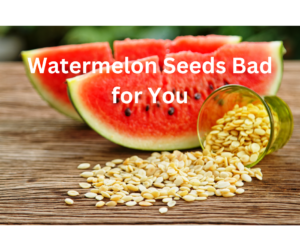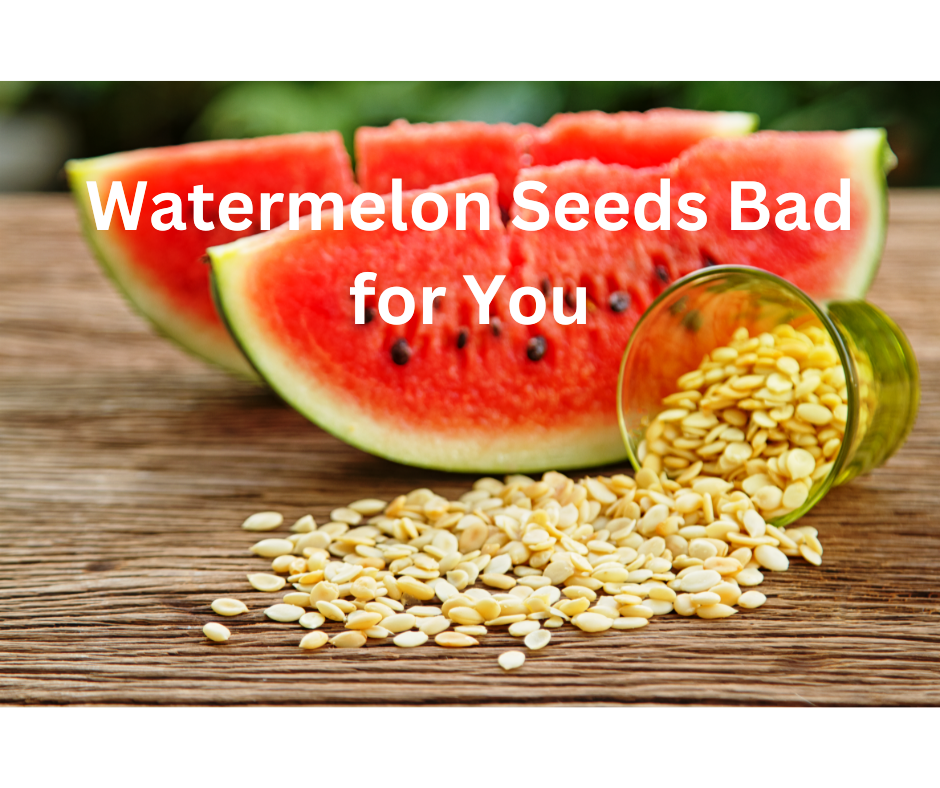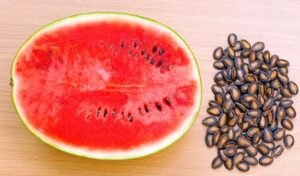Introduction Watermelon seeds
Watermelon Seeds Bad for You , frequently neglected and disposed of, hold surprising importance. These little seeds, settled inside the delicious tissue of the watermelon natural product, gloat an astonishing cluster of supplements and potential medical advantages. While some could excuse them as simple aggravations, others perceive their healthy benefit and culinary adaptability. In this article, we dig into the universe of watermelon seeds, investigating their dietary substance, potential well-being dangers, and ways of integrating them into our eating regimens securely. Thus, we should unwind the secrets of these unassuming seeds and find the reason why they are something beyond a result of partaking in a flavorful watermelon.

Nutritional Value of Watermelon Seeds
Watermelon seeds might be little, however, they sneak up all of a sudden which could shock you. Wealthy in protein, sound fats, and fundamental supplements, these minuscule seeds offer a scope of medical advantages. Simply a modest bunch of watermelon seeds can give a critical lift to your day-to-day supplement consumption. We should investigate the healthy benefit of watermelon seeds:
Protein:
Notwithstanding their size, watermelon seeds are an amazing wellspring of protein. As a matter of fact, they contain around 30 grams of protein for each 100 grams of seeds, making them an important expansion to veggie lover and vegetarian eats less.
Solid Fats:
Watermelon seeds contain a blend of sound fats, including monounsaturated and polyunsaturated fats. These fats are fundamental for heart wellbeing and can assist with bringing down cholesterol levels when consumed as a feature of a reasonable eating regimen.
Fiber:
Fiber is one more supplement found in watermelon seeds. Sufficient fiber admission is pivotal for stomach related wellbeing, advancing standard solid discharges and forestalling blockage.
Nutrients and Minerals:
Watermelon seeds are loaded with fundamental nutrients and minerals, including magnesium, potassium, iron, and zinc. These supplements assume fundamental parts in different physical processes, for example, muscle capability, safe help, and energy creation. By and large, watermelon seeds are a supplement thick food that can add to your general wellbeing and prosperity when polished off as a feature of a reasonable eating regimen. In this way, the following time you partake in a cut of watermelon, don’t dispose of the seeds — consider saving them for a nutritious tidbit or integrating them into your dinners for an additional wellbeing support.
Watermelon Seeds Bad for You
- Gagging Risk: One of the essential worries with watermelon seeds is their little size, which represents a stifling danger, especially for small kids or people with gulping hardships. Unintentionally breathing in or gulping a seed can prompt gagging or respiratory issues.
- Stomach related Issues: Eating an enormous amount of watermelon seeds at a time can cause stomach related distress, for example, swelling, gas, or stomach upset. The hard external shell of the seeds might be challenging for certain people to process, prompting gastrointestinal issues.
- Potential for Diverticulitis: A few specialists propose that polishing off seeds, including watermelon seeds, may expand the gamble of diverticulitis — a condition described by irritation or disease of little pockets in the gastrointestinal system. Nonetheless, more examination is expected to authoritatively affirm this affiliation. While watermelon seeds offer dietary benefit, it’s urgent to drink them carefully and with some restraint. In the event that you decide to eat watermelon seeds, consider ways of diminishing the related dangers, for example, eliminating the seeds prior to eating or selecting seedless assortments of watermelon. Also, consider elective techniques for polishing off watermelon seeds, like cooking or crushing, to upgrade edibility and lessen the gamble of gagging. By monitoring the likely dangers and playing it safe, you can partake in the wholesome advantages of watermelon seeds while limiting any unfavorable consequences for your wellbeing.
Potential Health Risks
Despite their nutritional benefits, watermelon seeds also pose potential health risks. One concern is the presence of compounds like cyanide, albeit in small amounts. Consuming large quantities of seeds could potentially lead to cyanide poisoning.
Furthermore, the hard outer shell of watermelon seeds can be difficult to digest for some individuals, leading to discomfort or digestive issues.
Concerns for Specific Health Conditions
Individuals with certain health conditions, such as diverticulitis or kidney problems, may need to exercise caution when consuming watermelon seeds. The hard texture of the seeds could exacerbate symptoms or lead to complications.
Consumption Guidelines
To minimize potential risks, it’s essential to consume watermelon seeds in moderation. Enjoying a few seeds occasionally as part of a balanced diet is unlikely to cause harm.
Alternative Options
If you prefer to avoid watermelon seeds altogether, there are alternative ways to enjoy this delicious fruit. Seedless watermelon varieties are readily available and offer the same juicy sweetness without the hassle of seeds.
Myths vs. Facts
There are several misconceptions surrounding watermelon seeds, such as the belief that swallowing them will lead to watermelon plants growing in your stomach. In reality, the seeds are simply passed through the digestive system without sprouting.
Tips for Seed Removal
For those who still enjoy seeded watermelon, there are effective methods for removing the seeds. Simply cutting the fruit into smaller pieces or spitting out the seeds as you eat can help prevent any discomfort.
Expert Opinions
Nutritionists and health professionals advise that while watermelon seeds can be part of a healthy diet, moderation is key. They recommend focusing on the overall balance of nutrients rather than fixating on individual components.
Personal Experiences
Many individuals have enjoyed watermelon seeds as a snack or garnish without experiencing any adverse effects. However, personal tolerance may vary, so it’s essential to listen to your body and adjust your intake accordingly.
Research Findings
Studies investigating the effects of watermelon seeds on health have yielded mixed results. While some research suggests potential benefits, such as antioxidant properties, more studies are needed to fully understand their impact.
Conclusion
In conclusion, while watermelon seeds offer nutritional benefits, they also come with potential health risks that need to be considered. Moderation is key when incorporating watermelon seeds into your diet, and alternative options are available for those who prefer seedless varieties.
FAQs
1. Can you eat watermelon seeds raw?
– Yes, watermelon seeds can be eaten raw, but moderation is key to avoid potential digestive issues.
2. Are roasted watermelon seeds healthier than raw ones?
– Roasting watermelon seeds can make them easier to digest and enhance their flavor, but it’s essential to avoid excessive salt or oil during the roasting process.
3. Do watermelon seeds have any nutritional benefits?
– Yes, watermelon seeds are rich in protein, healthy fats, vitamins, and minerals, offering various nutritional benefits.
4. Can eating watermelon seeds lead to cyanide poisoning?
– While watermelon seeds contain trace amounts of cyanide, consuming them in moderation is unlikely to cause cyanide poisoning in healthy individuals.
5. Are there any benefits to removing watermelon seeds before consumption?
– Removing watermelon seeds can make it easier to enjoy the fruit without any potential discomfort or digestive issues, especially for those with sensitive stomachs.





